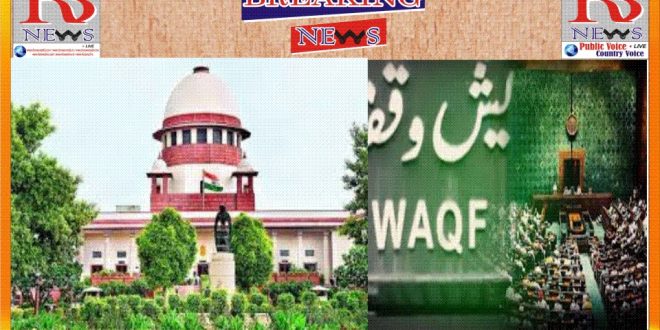New Delhi: The Supreme Court will hear the Waqf Amendment Act for the second consecutive day today. It is believed that today the country’s top court can issue an interim order in this matter. The Supreme Court can pass this interim order regarding de-notifying Waqf properties, not implementing new provisions during the Collector’s investigation and entry of non-Muslims in the Council along with the Waqf Board.
Earlier, a two-hour hearing was held in the Supreme Court on Wednesday against the Waqf Amendment Act. The Supreme Court has sought a reply from the Central Government on these petitions within two weeks. In yesterday’s hearing, the Supreme Court has not immediately stayed the implementation of the law but has expressed concern over the violence happening across the country in protest against the Waqf Act.
72 petitions against Waqf Act
Earlier yesterday, a bench of Chief Justice Sanjiv Khanna, Justice Sanjay Kumar and Justice KV Vishwanathan heard 72 petitions against the constitutionality of the Waqf (Amendment) Act, 2025. After hearing arguments by Solicitor General Tushar Mehta on behalf of the Centre and senior advocates including Kapil Sibal, Rajiv Dhawan, Abhishek Singhvi, CU Singh on behalf of Muslim bodies and individual petitioners, the Chief Justice proposed to issue notice and pass an interim order, saying that this would “balance the equalities”.
Allegation of violation of fundamental rights
The biggest allegation of the opponents was that the new Waqf law violates the fundamental rights of Muslims and discriminates against Muslims. They also argued that this law is unconstitutional, so its implementation should be stopped. Solicitor General Tushar Mehta on behalf of the Central Government termed this allegation as baseless. After this, the bench said, some provisions of the new law are good, but some provisions like Waqf by User and non-Muslim members in Waqf Board need clarification from the government.
The court asked the government what is the purpose of including non-Muslims in its Waqf Council? Will the government allow Muslims to be included in the boards of temples? After this, the Supreme Court said what will be the effect of ending the provision of Waqf by User? The properties which have been declared as Waqf property by the court, will they also be de-notified under the new law? The Supreme Court asked that from where will the Waqf Board bring the papers of the hundreds of years old historical buildings or properties which are with the Waqf? After this, the three-judge bench said that they want to pass an interim order in this case. On this, Solicitor General Tushar Mehta requested that he wants to put forward some more arguments in this matter. If the Supreme Court wants, it can hear this matter on a day to day basis. After this, the Chief Justice’s bench decided to hear the matter again on Thursday.
Kapil Sibal’s argument
Kapil Sibal, who was arguing against the Waqf law, said that there was no such system 300 years ago, then from where will they bring the deed of those mosques? On this, the Supreme Court asked the Centre why Waqf by User was removed, to which the Solicitor General said that the properties registered as Waqf will remain Waqf. The court asked what will happen to the properties registered as Waqf by User, to which the Centre replied that the Collector will investigate the property and bring it on record. Kapil Sibbal called the entry of non-Muslims in the board unconstitutional, to which the Supreme Court asked the SG why the provision of non-Muslim members was made in the board? In response to this, the SG said that most of the members in the board are Muslims and the number of non-Muslim members will not exceed 2.
Earlier, the bench said, “Properties declared as waqf by the courts should not be de-notified as waqf, whether they are waqf by user or waqf by deed, although the court is hearing a petition challenging the Waqf Amendment Act 2025.” The bench also indicated a stay on a provision of the amended law, which states that a waqf property will not be considered a waqf until the collector examines whether the property is government land or not.
The bench noted the provision-wise objections to the Act and expressed objections to several aspects of the law, including the inclusion of non-Muslims in the Central Waqf Council and State Waqf Boards. It also objected to provisions giving the District Collector the power to settle disputes related to waqf properties and allowing de-notification of properties declared as waqf by competent courts.
The Chief Justice said, “Usually, courts do not interfere at the initial stage when a law is passed. But in this case an exception may be required. If a property declared as wakf is de-notified by the user, it may have serious consequences.”
Heartened exchanges
During the hearing, there was a heated exchange between the bench and the Solicitor General when the judges questioned the logic behind allowing non-Muslims in Waqf administration when the same reciprocity does not apply to Hindu religious institutions. The law officer said that the Waqf Council will not include more than two non-Muslim members apart from the ex-officio members. He offered to say this in an affidavit. However, the bench said that out of the 22 members of the Central Waqf Council under the new Act, only eight will be Muslims. The bench asked, “If there are eight Muslims, then there can also be two judges who are not Muslims. This makes the non-Muslims a majority. How is this consistent with the religious character of the institution?”
 RB News World Latest News
RB News World Latest News






